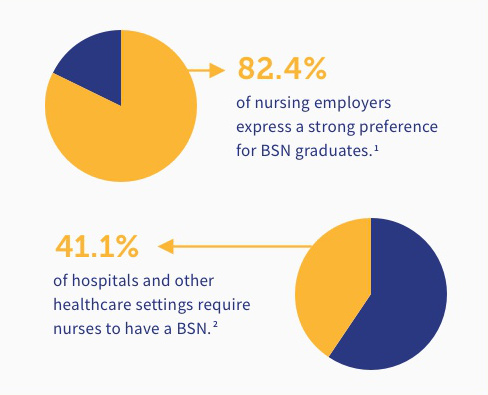First, you need to obtain your credentials.
This comes with coursework and then licensure.
Education 
To become a nurse, you have a few education options ranging in program length and each with their own benefits. After obtaining your high school diploma or equivalent (such as a GED), you can pursue a nursing diploma program or bachelor’s degree in nursing.
A Bachelor’s in Nursing (BSN) is the most preferred of nursing employers (82.4% have a strong preference for a BSN) and 41.1% of hospitals actually require one.1
Licensure 
Once you’ve fulfilled education requirements, you’ll need to pass the RN test and obtain licensure in your state.3
Carlow's BSN grads pass NCLEX on their first try at a rate that exceeds state and national averages.
Practice 
Once you’re a registered nurse, you can choose your adventure. What’s next for you? Do you want to specialize in a particular area or pursue management opportunities? Nursing has a number of advanced degrees and specialities. Or, are you ready to dive right in and get to work?
Start Your Adventure
Carlow’s nursing degree programs were created with you in mind. Starting with our BSN programs whether you take a traditional 4-year path that leads to a BSN or the second-degree BSN, a 15-month program after perquisites are complete to earn your BSN as a second bachelor’s degree. Carlow also offers advanced master’s of science in nursing and doctor of nursing practice degrees for deepening your specialization and opportunities for leadership. All of Carlow’s programs are fully accredited by the Commission on Collegiate Nursing Education and approved by the Pennsylvania State Board of Nursing.
Nursing Program
Hit the ground running with a diploma or introductory programs that help you you’re your RN. These programs are found in hospitals, associate’s degree programs at community colleges, and other nursing-specific colleges.
Bachelor’s in Nursing (BSN)
Or, obtain a bachelor’s in nursing with a four-year degree full of clinical experiences and coursework in fields like microbiology, anatomy, pathophysiology and caring for specific populations. If you’re already a registered nurse, many schools provide RN to BSN programs that help accelerate a practicing nurse to gain the additional credentials for a bachelor’s degree.
Second Degree Bachelor’s in Nursing (BSN)
A second bachelor’s degree in nursing is usually an accelerated program for individuals who have already obtained a bachelor’s degree in another field, but need the specific coursework and hands-on training to practice nursing.
Pass the Test
You’ll take the National Council Licensure Exam for Registered Nurses (or NCLEX-RN).3
Carlow's BSN grads pass NCLEX on their first try at a rate that exceeds state and national averages.
Obtain Licensure
You will also need to receive state RN licensure (which has varying requirements depending on the state). For example, in Pennsylvania, you can do this either by examination or endorsement (if you already have a license in another state), and it includes specific background check requirements as well as recognizing child abuse education.4
Hospital Nurse
Whether it’s the Intensive Care Unit, Emergency Room, or a surgical unit, hospital nurses gain experience addressing many different kinds of patient needs. They learn to work in exciting situations, and no day is the same. These experiences, and the ability to think quickly provide hospital nurses with great opportunities for advancement, not just in a hospital itself but in other nursing areas. No matter where you want to go next, employers want to hire a nurse with hospital experience because they know they can think on their feet, are detail-oriented and usually understand a broad range of medical areas.
$78,070
Average salary for a hospital nurse5
Outpatient Nurse
Outpatient nurses — or ambulatory nurses — work in medical facilities where patients aren’t required to stay overnight, such as a primary physicians offices, specialist’s office, diagnostics, such as an x-ray facility or lab, or a rehabilitation, treatment or minor surgery center where a patient is able to go home that day. The hours are more reflective of a typical workday and workweek, like a 9 to 5.
$76,700
Average salary for an outpatient nurse6
Traveling Nurse
Travel nurses work as contract employees and fill-in for staff shortages all over the country. Their contracts run anywhere from a few weeks to several months. The positions pay well, and typically include housing stipends. Assignments may be in various clinical settings, such as hospitals, nursing facilities, and more.7 This is a great opportunity if you’d like to see new parts of the country but are not ready to make a full-on move, and it’s also a great way to collect all kinds of nursing experiences in various settings.
Long-Term Care Nurse
A long-term care nurse works with patients in need of extended care, such as those with long-term illnesses and disabilities. This might mean working with patients who are recovering from accidents, are undergoing cancer treatment, or live in a nursing home for end-of-life treatment. This growing and needed field of nursing gives you the chance to get to know your patients and their care needs on a deeper level.
Public Health & Policy Nurse
Health policy nurses work with government agencies, non-profits and other health organizations to advocate for and help decision-makers draft rules, adopt policies, and make other decisions that take into consideration patient needs, nursing needs, and elevate overall access and changes needed in the healthcare industry from an experienced perspective. They must be informed in both nursing issues as well as patient outcomes.
Additional Areas
There are so many other interesting areas in nursing!
Just a few include:
FORENSIC NURSE
HOSPICE
ONCOLOGY
HEALTH POLICY NURSE
PSYCHIATRIC NURSE
CLINICAL RESEARCH
NURSE EDUCATOR
Keep Learning (NP, MSN, DNP, Certificate Programs)
Nursing is a career where you’ll never stop learning. For some, that means earning advanced degrees to gain a deeper understanding in particular specialties or take on more leadership roles. This is how you can become an Advanced Practice Registered Nurse or APRN, which includes leadership nursing roles like nurse practitioner and other certification programs. Nurses can pursue doctorate and master’s degrees after a few years of practice or right after their bachelor’s degree programs.
MSN
A Master’s of Science in Nursing
DNP
A Doctor of Nursing Practice (DNP)
A few careers you can pursue with advanced degrees include Nurse Practitioner (NP), Certified Registered Nurse Anesthetist (CRNA), Clinical Nurse Specialist, or Clinical Nurse Leader. Each of these have their own education requirements, certification exams and licensures, so if there’s one specific you’d like to pursue or find out more about, it’s definitely worth talking to a program advisor for more information



























